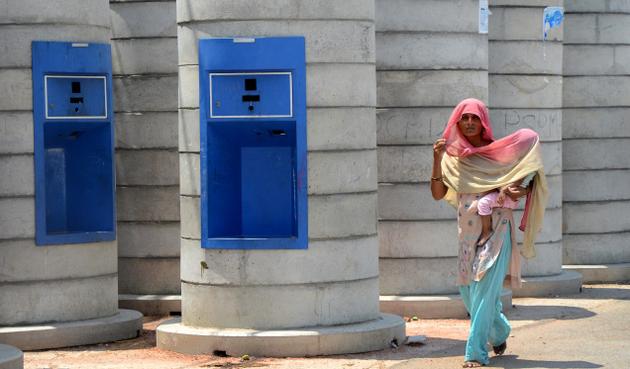An Ingenious Solution To Water Scarcity
A woman walking past a water "ATM"

The Delhi Jai Board in collaboration with for-profit social enterprise Piramal Water Private Ltd (Sarvajal) has helped to combat the water shortage problems that many slums and resettlements in Delhi face everyday by setting up 24/7 water ATMs. These ATMs allow people to draw up to 20 litres at a given time, using a rechargeable smartcard. One litre of water costs 15 to 30 paise depending on the location of the kiosk, and money is immediately deducted from the smartcard every time water is drawn up. The ATMs are solar-powered and can hold 500 litres of water supply to distribute, though they are only filled up to 300-400 litre to make sure that all the water is used. The quanity and quality of the water is monitored by Sarvajal.
The pilot project, which installed 15 of the water ATMs at a resettlement colony, Savda Ghevra was not as successful as the DJB hoped. The ATMs receive the water from a water treatment plant, which takes ground water, and purifies it through reverse osmosis. Of the 7,500 families that live in the colony, currently only 850 families are using the water ATMs, a number which will hopefully grow. Despite the initiative not being as successful as originally thought, Delhi’s Lieutenant Governor Najeeb Jung approved setting up 500 more water ATMs across Delhi, specifically targeting water deficient areas which do not have pipe networks delivering water.
DJB officials have defended the project by showing that while it has drawn massive support from people, it has provided an alternate source of clean water. They believe that because residents of the colony are already receiving water from the water tankers, they are less willing to try something new. However, DJB has been working to change the mindsets of the residents, through educating them on the advantages of using the kiosks, such as saving on medical bills.
Despite the lukewarm reception from residents of the colony, the pilot project was visited earlier this month by Queen of Netherlands, Queen Maxima as part of her role as United Nations Secretary-General’s Special Advocate for Inclusive Finance for Development. Her main concern was where the wasted water went, but was assured that the water went to a recharge pit with rainwater. She was impressed by the initiative and believed in the project enough to try the water herself.



